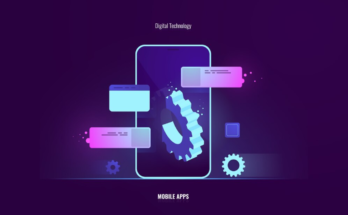The Role of Cloud Computing in Mobile App Development. Cloud computing has revolutionized the way mobile applications are developed, deployed, and managed. In today’s digital age, mobile app developers face the challenge of building scalable, high-performance applications that can operate smoothly across diverse devices and platforms. To meet this demand, cloud computing offers a powerful solution by providing flexibility, cost-effectiveness, and scalability. In this article, we’ll explore the critical role of cloud computing in mobile app development and how it benefits developers, users, and businesses alike.
What is Cloud Computing?
Cloud computing refers to the delivery of computing services, such as servers, storage, databases, networking, software, and analytics, over the internet (“the cloud”). Instead of relying on local servers or personal devices, cloud-based systems allow data and services to be accessed and managed remotely. This model enables developers to build applications without investing heavily in physical infrastructure.
Cloud Computing Models
There are three primary models of cloud computing, which are also integral to mobile app development:
- Infrastructure as a Service (IaaS): Provides virtualized computing resources such as virtual machines, storage, and networking.
- Platform as a Service (PaaS): Offers a platform allowing developers to build, test, and deploy applications without worrying about the underlying infrastructure.
- Software as a Service (SaaS): Delivers software applications over the cloud, eliminating the need for installation on individual devices.
Benefits of Cloud Computing in Mobile App Development
Cloud computing offers several key advantages that directly impact the efficiency, scalability, and flexibility of mobile app development:
1. Scalability
One of the most important benefits of cloud computing is its scalability. When developing mobile apps, it’s essential to anticipate traffic fluctuations—especially if the app is likely to experience periods of high usage. Cloud platforms can automatically scale resources up or down based on demand, ensuring that the app runs smoothly regardless of the traffic.
For instance, AWS and Google Cloud Platform provide autoscaling features that allow developers to manage server resources dynamically, ensuring that apps don’t experience downtime during traffic spikes.
Code Example: Autoscaling on AWS
Resources:
AutoScalingGroup:
Type: AWS::AutoScaling::AutoScalingGroup
Properties:
MinSize: '1'
MaxSize: '10'
DesiredCapacity: '5'
VPCZoneIdentifier:
- subnet-0bb1c79de3EXAMPLE2. Cost Efficiency
Traditional mobile app development often requires significant investment in hardware and maintenance of servers. With cloud computing, developers can reduce these costs by paying for only the resources they use. The “pay-as-you-go” pricing model means businesses don’t need to invest in expensive infrastructure, which can be a major financial relief for startups and small businesses.
Moreover, cloud services eliminate the need for constant hardware upgrades, since the cloud provider manages the infrastructure, resulting in reduced overhead costs.
3. Faster Development and Deployment
Cloud platforms offer integrated tools that accelerate the app development lifecycle. From code deployment to testing and debugging, cloud services provide developers with tools that streamline the entire development process.
For example, using PaaS platforms like Heroku or Google App Engine, developers can deploy applications with a few clicks or commands, cutting down the time required for deployment.
Code Example: Deploying a Node.js App on Heroku
git init
git add .
git commit -m "Initial commit"
heroku create
git push heroku master4. Cross-Platform Compatibility
Mobile apps must run on different operating systems and devices, such as Android and iOS. Cloud computing simplifies cross-platform development by providing a centralized platform that can host applications for multiple platforms.
Developers can use cloud-based backends to ensure that users on various devices can seamlessly access the app and its data. Additionally, using cloud-based services like Firebase (from Google) or AWS Amplify, developers can easily integrate cross-platform functionalities such as user authentication, real-time databases, and file storage.
5. Data Synchronization and Collaboration
Cloud computing enables real-time data synchronization between devices, allowing users to access the latest data across multiple devices. This is particularly beneficial for mobile apps that involve collaboration, such as file-sharing apps or communication tools.
By leveraging cloud storage, developers can ensure that users have access to consistent and up-to-date information, regardless of the device or platform they are using.
6. Enhanced Security
Security is a major concern in mobile app development, especially when sensitive data is involved. Cloud providers like AWS, Microsoft Azure, and Google Cloud offer advanced security protocols, including data encryption, identity management, and multi-factor authentication.
Developers can benefit from the robust security infrastructure provided by cloud platforms without having to build these systems from scratch. This ensures that both the app and its data are protected against potential threats.
7. Disaster Recovery and Backup
Cloud computing platforms offer built-in disaster recovery solutions, which is critical for mobile app development. Data loss can occur due to system failures, hardware malfunctions, or cyberattacks. Cloud services enable automatic backups, ensuring that data can be quickly restored in the event of an outage.
By utilizing cloud storage and backup solutions, developers can maintain business continuity and protect against data loss.
The Future of Cloud Computing in Mobile App Development
As mobile technology evolves, cloud computing will continue to play an increasingly significant role. Innovations like serverless computing, which allows developers to run apps without managing servers, and the integration of AI and machine learning into cloud services, will enable developers to build smarter, more efficient mobile applications.
Moreover, as 5G technology becomes more prevalent, the speed and efficiency of cloud-based mobile apps will improve, allowing for even more sophisticated features and real-time interactivity.
FAQs
Q: What is cloud computing in mobile app development?
A: Cloud computing provides developers with scalable, flexible, and cost-effective infrastructure and services that enhance the development, deployment, and management of mobile apps.
Q: What are the advantages of using cloud computing in mobile apps?
A: Key benefits include scalability, cost-efficiency, faster development, cross-platform compatibility, real-time data synchronization, enhanced security, and disaster recovery.
Q: How does cloud computing improve app scalability?
A: Cloud platforms offer autoscaling features, allowing apps to adjust resources based on real-time demand, ensuring smooth performance during traffic spikes.
Q: Can cloud computing improve mobile app security?
A: Yes, cloud providers offer robust security measures like encryption, identity management, and multi-factor authentication, enhancing the app’s security.
Q: What is the role of cross-platform compatibility in cloud computing?
A: Cloud computing simplifies cross-platform app development by hosting centralized backends that can serve apps across various platforms like Android and iOS.



